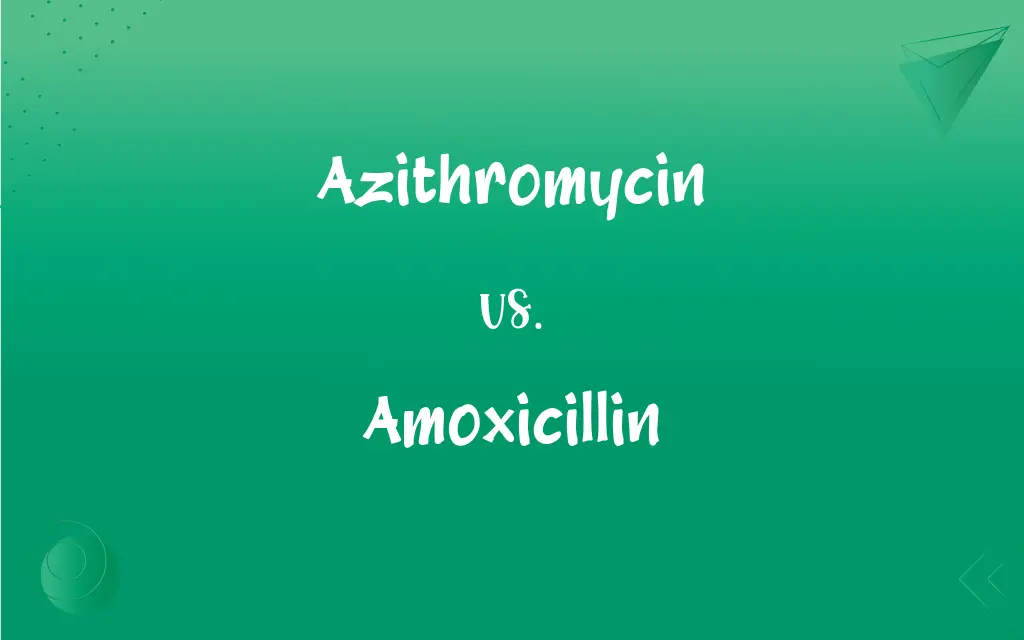Azithromycin vs. Amoxicillin: What's the Difference?
Edited by Aimie Carlson || By Harlon Moss || Published on February 26, 2024
Azithromycin is a broad-spectrum macrolide antibiotic effective against certain bacteria, while Amoxicillin is a penicillin-type antibiotic used for a wider range of infections.

Key Differences
Azithromycin is known for treating respiratory and skin infections, effective against a variety of gram-positive and some gram-negative bacteria. Amoxicillin is often prescribed for ear, nose, throat, urinary tract, and skin infections.
Azithromycin has a longer half-life, allowing for shorter treatment courses, typically 3-5 days. Amoxicillin requires a longer course of treatment, usually 7-14 days, depending on the infection.
Azithromycin is part of the macrolide class, known for fewer allergic reactions in patients allergic to penicillin. Amoxicillin, as a penicillin-type antibiotic, may not be suitable for those with penicillin allergies.
Azithromycin is less likely to cause gastrointestinal issues compared to other antibiotics but may cause heart rhythm issues in rare cases. Amoxicillin is generally well-tolerated but can cause gastrointestinal upset in some patients.
Azithromycin is a good choice for specific bacterial infections, particularly for those with penicillin allergies, while Amoxicillin is a more general antibiotic used for a broader range of infections.
ADVERTISEMENT
Comparison Chart
Antibiotic Class
Macrolide
Penicillin
Spectrum
Broad, but more limited compared to Amoxicillin
Broad, effective against more bacteria
Treatment Duration
Shorter courses (3-5 days)
Longer courses (7-14 days)
Common Uses
Respiratory, skin infections
Ear, nose, throat, urinary tract, skin infections
Allergic Reactions
Fewer in those allergic to penicillin
Not suitable for penicillin-allergic patients
ADVERTISEMENT
Azithromycin and Amoxicillin Definitions
Azithromycin
A medicine with a longer half-life allowing shorter treatment courses.
Azithromycin's five-day course is convenient for patients.
Amoxicillin
A penicillin-type antibiotic used to treat various infections.
Amoxicillin is commonly prescribed for ear infections.
Azithromycin
An antibiotic used to treat various bacterial infections.
The doctor prescribed Azithromycin for my bronchitis.
Amoxicillin
An antibiotic effective against a wide range of bacteria.
For his throat infection, the doctor recommended Amoxicillin.
Azithromycin
A macrolide antibiotic effective against certain bacteria.
Azithromycin is often used to treat skin and respiratory infections.
Amoxicillin
A drug used for bacterial infections, not effective for viral infections.
Amoxicillin won't be effective against your cold since it's caused by a virus.
Azithromycin
An antibiotic less likely to cause allergic reactions in penicillin-sensitive individuals.
Given her penicillin allergy, she was prescribed Azithromycin instead.
Amoxicillin
An antibiotic that can cause allergic reactions in individuals sensitive to penicillin.
He had an allergic reaction to Amoxicillin due to his penicillin allergy.
Azithromycin
A drug used for treating bacterial infections, not effective against viruses.
Azithromycin won't help with the flu since it's a viral infection.
Amoxicillin
A medicine used for treating infections of the ear, nose, throat, and urinary tract.
Amoxicillin helped clear up her urinary tract infection.
Azithromycin
A macrolide antibiotic, C38H72N2O12, used to treat a variety of bacterial infections.
Amoxicillin
A semisynthetic penicillin, C16H19N3O5S, having an antibacterial spectrum of action similar to that of ampicillin.
Azithromycin
(pharmaceutical drug) A semisynthetic macrolide antibiotic C38H72N2O12 (trademarks Zithromax, Z-PAK) that is derived from erythromycin and is used especially as an antibacterial agent.
Amoxicillin
(pharmaceutical drug) A moderate-spectrum, bacteriolytic beta-lactam antibiotic C16H19N3O5S closely related to ampicillin and with similar properties, but more readily absorbed when taken orally. It is used to treat bacterial infections caused by susceptible microorganisms.
Amoxicillin
An antibiotic; a semisynthetic oral penicillin (trade names Amoxil and Larotid and Polymox and Trimox and Augmentin) used to treat bacterial infections
FAQs
Is Azithromycin safe during pregnancy?
Consult a doctor as Azithromycin is generally considered safe, but individual assessment is needed.
Can Azithromycin treat ear infections?
Azithromycin can be used for ear infections, but Amoxicillin is more common.
Is Amoxicillin safe for children?
Yes, Amoxicillin is commonly prescribed for children in appropriate doses.
What infections does Azithromycin treat?
Azithromycin is used for respiratory, skin, and some sexually transmitted infections.
Does Azithromycin interact with other medications?
Yes, Azithromycin can interact with certain medications, so inform your doctor about all medications you're taking.
What is Amoxicillin commonly used for?
Amoxicillin is used for ear, nose, throat, urinary tract, and skin infections.
Can I drink alcohol with Azithromycin?
It's best to avoid alcohol during treatment as it can interfere with the medication's effectiveness.
Can Azithromycin cause allergies?
While less common, Azithromycin can cause allergic reactions in some individuals.
Can Amoxicillin be taken on an empty stomach?
Yes, Amoxicillin can be taken with or without food.
Does Azithromycin affect birth control?
Azithromycin does not typically interfere with hormonal birth control.
Is Amoxicillin effective against all bacteria?
Amoxicillin is broad-spectrum but not effective against all bacteria.
How quickly does Azithromycin work?
Azithromycin starts working within a few days, but the full course should be completed.
What are the side effects of Amoxicillin?
Common side effects include nausea, vomiting, diarrhea, and allergic reactions.
Can I stop taking Amoxicillin if I feel better?
No, the full prescribed course should be completed to prevent antibiotic resistance.
Are Azithromycin and Amoxicillin safe for the elderly?
Both antibiotics can be safe for the elderly, but doses may need adjustment.
Can Azithromycin be used for a sore throat?
It can be, but Amoxicillin is often preferred for strep throat.
Is Azithromycin a strong antibiotic?
Azithromycin is effective for specific infections, but "strong" can be subjective.
Does Amoxicillin need to be refrigerated?
Some forms of Amoxicillin should be refrigerated, but others are fine at room temperature. Check the label or ask a pharmacist.
Can Amoxicillin cause diarrhea?
Yes, like many antibiotics, Amoxicillin can cause gastrointestinal upset.
How long does it take for Amoxicillin to work?
Improvement is usually seen within a few days, but the entire course should be completed.
About Author
Written by
Harlon MossHarlon is a seasoned quality moderator and accomplished content writer for Difference Wiki. An alumnus of the prestigious University of California, he earned his degree in Computer Science. Leveraging his academic background, Harlon brings a meticulous and informed perspective to his work, ensuring content accuracy and excellence.
Edited by
Aimie CarlsonAimie Carlson, holding a master's degree in English literature, is a fervent English language enthusiast. She lends her writing talents to Difference Wiki, a prominent website that specializes in comparisons, offering readers insightful analyses that both captivate and inform.































































